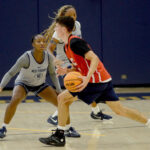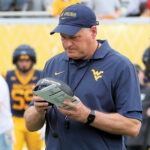Hodge is quietly building a roster of winners
MORGANTOWN — While the taste of football begins to filter into the hot summer air as the West Virginia Mountaineers begin their summer camp this week, so close that it no longer is too early to begin laying out tailgate menus and stocking up on libations to go with it, a mile and a half across town the attention has switched to basketball.
New men’s coach Ross Hodge is in the final process of completing a job that he started from scratch, as he is building both a staff and a roster. It remains a work in progress, with him recently telling a press gathering that he has one spot open on his roster and one on his coaching staff and expects to fill both.
It isn’t easy.
Building a staff or roster is one thing, but building a winning staff or roster quite another.
With a roster that has zero carryovers from Darian DeVries’ team of a year ago, he has had to concentrate on adding talented players capable not only of playing in Division 1, but in winning at the level of the Big 12.
“For us, what you try to do is get guys that have won and been part of winning programs,” he said. “You look at Honor Huff, who won the NIT. Big Harlan (Obioha) played in the NCAA Tournament. Jackson Fields played in the NCAA Tournament. Morris (Ugusuk) played in the NCAA Tournament as a freshman. Chance (Moore) has won 20 games every year he’s been in college. DJ (Thomas) won a lot of high school games. They have experience with winning and kind of understand that part of it and what winning takes. Now you’re just trying to get them to understand how are we going to win together?”
There is a difference between a good player, even a star player, and a winning player.
A star player towers above his opponents but a winning player has a way of making his team tower above its opponents.
It’s a skill and it comes in all different sizes and packages but is the necessary ingredient in all the sports.
You don’t teach the skill, for it is inborn. Instead, as a coach, you cultivate it.
On the WVU campus, the most obvious example of what we’re talking about came in the package known as Joe Mazzulla, who knew how to win and injected it into those playing with him. The Mountaineers went to a Final Four with him and, when he turned to coaching, he led the legendary Boston Celtics to an NBA title.
Hodge believes the group of players he has been assembling has similar traits and will become winners.
“They kind of understand that part of it and what winning takes,” he said. “Then you’re just trying to get them to understand how are we going to win and how are we going to win together. But you don’t have to teach them how to win necessarily.”
Even though they haven’t played a game, Hodge believes he can sense the ingredients that can be nursed into a winning group.
“They really support each other. They’ve got great hearts; they’ve been great teammates. They’re willing learners; they want to do what we’re asking them to do. This group works really hard, they like each other, they care about basketball, and they’re excited to go on this journey,” he said.
The leadership hierarchy will develop as the preseason practices go on. Who will take the clutch shots? Who will get them the ball? Who will give the locker room talk when the team trails at the half?
We’re not talking 20-point scorers or assist leaders, although you need them and they are part of the overall make up of a winning team.
But it’s as much about when you score as it is how many points you score. It’s taking a charge at the right moment that lights a fire or getting a defensive stop, even if your shooting is off on any given night.
The nice part about it is that the skill part may depend upon the level at which a player plays. A junior college player may tower above his opposition with one or two unique features but not be able to dominate when he gets to the Big 12, where everyone has a similar skill set.
But a winner at the junior college or Group of 5 level is a winner at the Big 12 level, for their greatest assets are not seen in the box score but instead on the practice floor, in team meetings, in the locker room and rising above the heat of the moment, not just to score winning basket, but to see that they don’t make a mistake with the game on the line and to set up the star to be in position to make that shot.
That comes from playing with each other, from trusting each other, anticipating what each other will do or won’t do in crucial moments.




